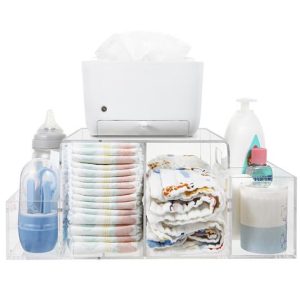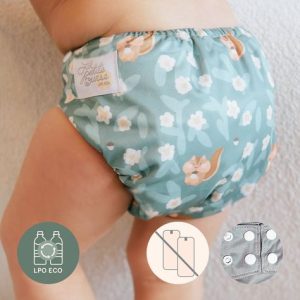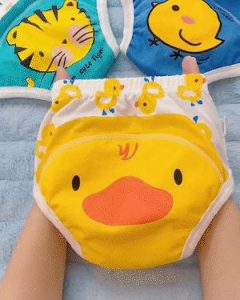Diapers are a vital part of baby care. They come in various types, sizes, and absorbency levels to suit your baby’s needs. But how long can you store diapers before they’re no longer ideal for use? Here’s a comprehensive guide to storing and using diapers safely and effectively.
Understanding Diaper Expiry
Unlike food or medication, diaper don’t have a strict expiration date. However, manufacturers recommend using unopened diaper within two years of purchase. This ensures optimal performance in terms of absorbency and leak prevention.
Factors Affecting Diaper Performance
Several factors can influence how well a diaper performs over time:
- Material Breakdown: Diapers are made of various materials that can degrade slightly over time. This can affect their absorbency and overall integrity.
- Storage Conditions: Extreme temperatures or humidity can negatively impact the materials in a diaper.

Storing Diapers for Optimal Use
Here are some tips for storing diapers to maintain their quality:
- Cool and Dry Place: Keep unopened diaper packages in a cool, dry location, ideally at room temperature. Avoid storing them in extreme heat, cold, or direct sunlight.
- Original Packaging: Store diaper in their original packaging. This helps protect them from dust, dirt, and moisture.
Signs Diaper Might Be Past Their Prime
While diaper technically don’t expire, there are some signs they might not be performing at their best:
- Unusual Odors: A noticeable chemical smell or other unpleasant odors can indicate material breakdown.
- Clumping or Brittleness: If the diaper feels stiff, clumpy, or powdery, it might be past its prime.
- Leaks: If you experience frequent leaks with a diaper that previously worked well, it could be a sign of decreased absorbency.
When to Consider Replacing Diaper
If you notice any of the signs above, it’s best to err on the side of caution and replace the diaper with a fresh pack.

Safety First: Proper Diaper Use and Storage
Here are some key points to remember for safe diaper use and storage:
- Follow Package Instructions: Always follow the manufacturer’s instructions for proper diaper use and disposal.
- Change Diaper Regularly: Change your baby’s diaper frequently to prevent diaper rash and discomfort.
- Store Diaper Out of Reach: Keep diaper out of the reach of children and pets.
By understanding diaper storage and signs of wear, you can make informed choices about using diapers safely and effectively. Remember, prioritizing your baby’s comfort and hygiene is key.
Making the Most of Your Diaper
While diaper technically don’t expire, there are ways to extend their shelf life and performance:
- Proper Storage: Keep unopened diaper packs in a cool, dry place like a closet or drawer. Avoid storing them in extreme heat, cold, or direct sunlight.
- Organization is Key: Use older packs first to ensure you’re using the diaper in the order they were purchased.

Eco-friendly Options: Diaper Recycling and Reuse
- Disposable Diaper Recycling: While not yet widely available, diaper recycling programs are emerging in some areas. Check with your local waste disposal service to see if they offer diaper recycling.
- Cloth Diaper Options: Cloth diapers are a reusable alternative with a lower environmental impact. They come in various styles and require washing and drying after each use.
When to Consider Buying New Diaper
If you’re unsure about the quality of your stored diaper, it’s best to buy new ones. Here are some signs to watch for:
- Unusual Odors: A noticeable chemical smell or other unpleasant odors can indicate material breakdown.
- Clumping or Brittleness: If the diaper feels stiff, clumpy, or powdery, it might be past its prime.
- Leaks: If you experience frequent leaks with a diaper that previously worked well, it could be a sign of decreased absorbency.
Finding the Right Diaper for Your Baby
With so many diaper options available, it’s important to find the right fit and absorbency level for your baby’s needs. Here are some tips:
- Consider Your Baby’s Weight and Age: Diapers come in various sizes to accommodate babies of different weights and ages.
- Think About Absorbency Needs: Overnight diapers are typically more absorbent than daytime diaper.
- Explore Different Features: Some diapers have features like wetness indicators or leak guards.
Remember: Every baby is different. Experiment with different diaper brands and styles to find the one that works best for your little one.

By understanding diaper storage and shelf life, you can make informed choices about using diapers effectively. Remember, prioritize your baby’s comfort and well-being when choosing diaper.
Getting the Most Out of Your Diaper
Diaper is an essential part of baby care. They come in various types, sizes, and absorbency levels to suit your baby’s needs. But how can you store diaper to maintain their quality and performance?
Here are some tips for storing diaper:
- Cool and Dry Place: Keep unopened diaper packages in a cool, dry location, ideally at room temperature. Avoid storing them in extreme heat, cold, or direct sunlight.
- Original Packaging: Store diapers in their original packaging. This helps protect them from dust, dirt, and moisture.
Remember: Always follow the manufacturer’s instructions for proper diaper use and disposal. By storing diapers correctly, you can help ensure they perform well for your baby.
When to Consider Buying New Diaper
If you’re unsure about the quality of your stored diaper, it’s always best to err on the side of caution and buy new ones. Here are some signs to watch for:
- Unusual Odors: A noticeable chemical smell or other unpleasant odors can indicate material breakdown.
- Clumping or Brittleness: If the diaper feels stiff, clumpy, or powdery, it might be past its prime.
- Leaks: If you experience frequent leaks with a diaper that previously worked well, it could be a sign of decreased absorbency.

Choosing the Right Diaper for Your Baby
With so many diaper options available, it’s important to find the right fit and absorbency level for your baby’s needs. Here are some tips:
- Consider Your Baby’s Weight and Age: Diapers come in various sizes to accommodate babies of different weights and ages.
- Think About Absorbency Needs: Overnight diaper are typically more absorbent than daytime diaper.
- Explore Different Features: Some diapers have features like wetness indicators or leak guards.
Remember: Every baby is different. Experiment with different diaper brands and styles to find the one that works best for your little one.
Conclusion
By understanding diaper storage and signs of wear, you can make informed choices about using diaper effectively. Remember, prioritizing your baby’s comfort and hygiene is key.





